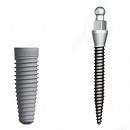
Regular implant on left in contrast to a mini implant on right
Mini dental implants were introduced several years ago for support of temporary bridges or dentures. However, more recently, manufacturers have been promoting mini dental implants as a permanent solution. They heavily market to general dentists, with the premise that the placement of the mini implants is easy enough, so that they can perform these procedures themselves rather than referring their patients to specialized surgeons and in the process increase their income. They also claim that mini dental implants are less invasive and less costly than regular implants.
But what do we know about mini dental implants?
Here are the facts: mini dental implants are indeed less costly, but not necessarily more invasive, certainly not nearly as predictable as regular implants, and most definitely ineffective in long term results.
Mini implants are not the best option for replacement of any teeth as they are associated with high degree of complications and failures. These include implant fractures, infection, and poor bony healing. Also mini dental implants do not allow proper tissue form which compromises its aesthetics as well as accessibility for effective hygiene. The surgical procedure itself, while it may seem easy, is certainly not simple and it is always best to consult with a trained surgeon.
I have spoken to many specialists around the country, both surgeons and prosthodontists, and I am yet to meet one who uses mini dental implants in their practice. There is a reason for this. The evidence simply does not exist and does not support their use for long term success. They may only be helpful in selected patients for short term use, providing support for transitional or temporary teeth.
If our goal is to achieve lifetime success for our patients, then it is best to avoid mini dental implants and use regular dental implants that have extensive research, documented success, and evidence that supports their longevity and effectiveness.